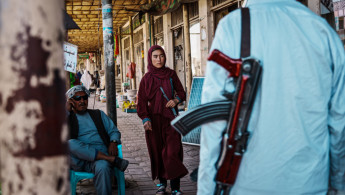Taliban treatment of women could be crime against humanity: UN expert
Taliban restrictions on the freedoms of women and girls could amount to a crime against humanity, the UN special rapporteur on human rights in Afghanistan said Friday.
Richard Bennett and other UN rights experts said the Taliban's targeting of women and girls deepens "flagrant violations of their human rights and freedoms that are already the most draconian globally and may amount to gender persecution -- a crime against humanity".
Most women who work for the government have lost their jobs -- or are being paid a pittance to stay at home -- since the Taliban returned to power in August 2021.
Afghan women have also been barred from travelling without a male relative and must cover up with a burqa or hijab when outside the home.
This month the Taliban barred women from entering parks, funfairs, gyms and public baths.
Schools for teenage girls have also been shuttered across most of the country.
"In recent months, violations of women and girls' fundamental rights and freedoms in Afghanistan, already the most severe and unacceptable in the world, have sharply increased," the UN experts said in a statement.
"Confining women to their homes is tantamount to imprisonment and is likely leading to increased levels of domestic violence and mental health challenges."
Women human rights defenders peacefully protesting the restrictions have for months been increasingly targeted, beaten, and arrested, they added.
Discriminatory Taliban measures "should be investigated as gender persecution with a view to prosecutions under international law", the experts said.
UN experts do not speak for the United Nations but are mandated to report their findings to the global body.
They urged the Taliban to respect women's fundamental rights and the international community to demand the restoration of women's freedoms and rights.
The UN Human Rights Office said separately it was "appalled" by the flogging of 11 men and three women in Afghanistan on Wednesday and called for "this abhorrent form of punishment to cease immediately".
They were flogged after being found guilty of theft and "moral crimes", an official said in Logar province.
The lashings were the first to be confirmed since the Taliban's supreme leader ordered judges this month to fully enforce sharia law.
"Corporal punishment is a human rights violation under international law," UN Rights Office spokeswoman Ravina Shamdasani said.
"We are also concerned that arrests, court hearings, sentencing and punishments are often all carried out on the same day. All people have the right to be treated with dignity and equality."





 Follow the Middle East's top stories in English at The New Arab on Google News
Follow the Middle East's top stories in English at The New Arab on Google News


